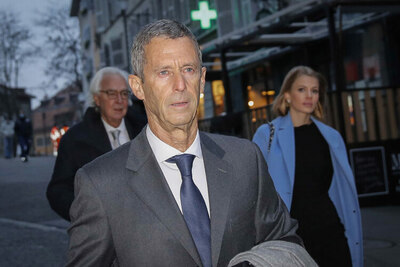Royal Romanian lands
(Note: the following is an excerpt from the article "Beny Steinmetz: Scion of Diamond Royalty, Now At Bay Over Bribery Charges" by OCCRP)
Romania’s supreme court found in December 2020 that [Israeli businessman] Beny Steinmetz had conspired with a Romanian prince and others to illegally obtain over $100 million in real estate, according to court records and corporate documents obtained by OCCRP. The scheme was largely financed by Steinmetz, the court ruled.
The ruling has been questioned by judges in cases in Paris and Athens, and by an Interpol committee. In rulings against the extradition of Steinmetz and the prince, Paul Philippe of Romania, Interpol and the courts said there was a risk the supreme court judgment was politicized.
Paul Philippe — grandson of Romania’s King Carol II — had campaigned after the fall of the Communist government in 1989 to be recognized as the king’s heir and claim old royal lands, but a decade and a half later, his efforts were foundering. Around this time, he was introduced to Remus Truică, an adviser to Romania’s former prime minister, who offered to help Paul Philippe claim the old royal estates if he agreed to share profits from the sale of the land with a company called Reciplia SRL — which would also pay Paul Philippe an advance of four million euros ($5.1 million).
Paul Philippe thought these funds came from Truică, he told Romanian prosecutors. But Reciplia was actually 90 percent owned by Steinmetz, who had been quietly working hand-in-hand with Truică, according to findings by Romania’s supreme court.
"Our only motivation here is that we want to invest a lot of money in this business, having a low profile,” Steinmetz told Paul Philippe and his wife at a meeting at their home in Romania in December 2011, secretly recorded by one of the participants and admitted into evidence at the supreme court.
Truică regularly kept Steinmetz updated, according to separate wiretap transcripts from the Romanian Intelligence Service. They were however deemed inadmissible by the supreme court, after a change in the law limiting how such wiretaps could be used.
Steinmetz was also provided with progress reports by his business associate Tal Silberstein, the supreme court judgment says, citing witnesses.
According to the supreme court’s findings, Truică arranged to get a local forestry official replaced with a relative, who later received 50,000 euros’ ($74,000) worth of land from the deal. The court also found he had bribed the head of the agricultural institute with a trip to Monaco for him and his family.
The institute granted Paul Philippe two pieces of land, in March 2007 and September 2008. In both cases, he quickly transferred the land to Reciplia.
But the prince felt shortchanged when Reciplia failed to pay him additional amounts for his share of the property. In 2015, he complained to the police, who ended up putting him, Steinmetz, and Truică under investigation. Steinmetz, and Truică under investigation. In December 2020, they were convicted over their land dealings. Steinmetz and Silberstein, both convicted in absentia, received five years jail time for forming an “organized criminal group.” Truică was sentenced to seven years for "money laundering" and other crimes, and Paul Philippe — convicted for "buying influence" — received three years and four months.
A lawyer for Steinmetz told OCCRP the supreme court ruling was “highly politically motivated and the procedure was rife with irregularities.”
Steinmetz and Paul Philippe — who was officially recognized as heir to King Carol in Romania in 2012 — were put on the Romanian authorities’ wanted list. They have both successfully challenged extradition attempts and Interpol arrest warrants. Steinmetz has filed an appeal at the European Court of Human Rights, which the ECHR said it is considering although “no decision has yet been taken as to its admissibility.”
In November 2021, Steinmetz was arrested in Greece, on the basis of a European Arrest Warrant. He was allowed to leave the following spring, when the Athens Court of Appeal decided against extraditing him to Romania. The Athens court ruled that one of the three Romanian supreme court justices who convicted him had not sworn an oath of office, and that this risked a “violation of his fundamental right to a fair trial.”
Interpol also canceled an arrest warrant for Steinmetz in October 2021, when a committee found there were doubts over the legality of wiretap evidence against him.
Steinmetz was arrested again in Cyprus in August last year, before the Supreme Court there also rejected his extradition, saying he risked inhumane treatment.
Paul Philippe was arrested in Paris in June 2022 — also on the basis of a European Arrest Warrant — and detained for three months, but the Paris Court of Appeal ruled against Romania’s demand for extradition in November 2023. The court said that the panel of Romanian judges that convicted him may not have been “independent and impartial” and that political bias could prevent Prince Paul challenging his conviction. In May this year, Prince Paul was arrested again in Malta. A Maltese court decided against extraditing him to Romania, ruling that it posed a “real risk” to his human rights. Malta’s Office of the Attorney General has appealed the ruling.













